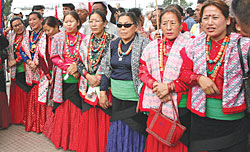 MIN RATNA BAJRACHARYA |
The CA polls have provided a positive result for the ethnic communities. Out of the 240 seats in the direct election, 79 ethnic candidates (32.9 per cent) have won seats. Similarly, out of 335 candidates in the PR, 120 (35.8 per cent) of those elected belong to various ethnic groups. Over all, ethnic candidates have won 199 seats, which makes 34 per cent of the total number of seats. A few more candidates are expected to be nominated by the prime minister for the 26 remaining seats.
A good number of ethnic candidates have represented each party, including 93 from the CPN-M, 37 from the NC, 36 from the UML and 7 from the MJF. In the CA elections, 191 women (33 per cent), 117 Madhesis (20 per cent), 49 Dalits (9 per cent) and 16 Muslims (3 per cent) have been elected. The representation of the Brahmin-Chettri has come down to 34 per cent whereas the representation of women, dalits and oppressed groups has gone up. This can be seen as a historical turn in Nepali politics.
The various ethnicities have taken the CA elections as the most democratic way of building a new state structure. They pressured the government to adopt a proportional representation system but the parties disagreed about using this on the basis of ethnic population. The government and the original inhabitants made a 20-point agreement to adopt representational candidates in the direct elections, make the PR system representative in the truest sense, and allow for at least one candidate from each ethnic group in the elections. As a result, in the FPTP system, the NC had 21 per cent, the UML 24 per cent and the Maoists 30 per cent, whereas in the PR the NC had 30 per cent, the UML 34 per cent and the Maoists 36 per cent ethic representation among their candidates. But the party with the largest ethnic representation was CPN-United which had 42 per cent in the FPTP and 41 per cent in the PR system.
While the figures look good in percentage terms, the actual ethnic representation is yet to be inclusive and proportional. Of the 59 listed ethnic groups, 33 have been represented in the assembly. Although this is a positive development, there are still 26 ethnic groups that need to be represented. The third amendment to the interim constitution agrees to have at least one representative from each of the listed ethnic groups. After conducting various rounds of talks the government and the parties agreed to include at least 10, or at the most 13, of the remaining ethic groups in the 26 seats reserved for nominated candidates. But now the political parties have broken their pledge and distributed the 26 seats among themselves. This leaves little or no room for some of the ethnic groups to have a say in the making of a new constitution.
The struggle for representation in the CA has almost ended and the fight for ensuring individual and group rights in the new state management has begun. We demand that the elected ethnic representatives have a role to play in all processes, including the making of the laws and policies. The government has already agreed to construct federal states on the basis of ethnicity and region. The new constitution should ensure federalism according to the agreement.


